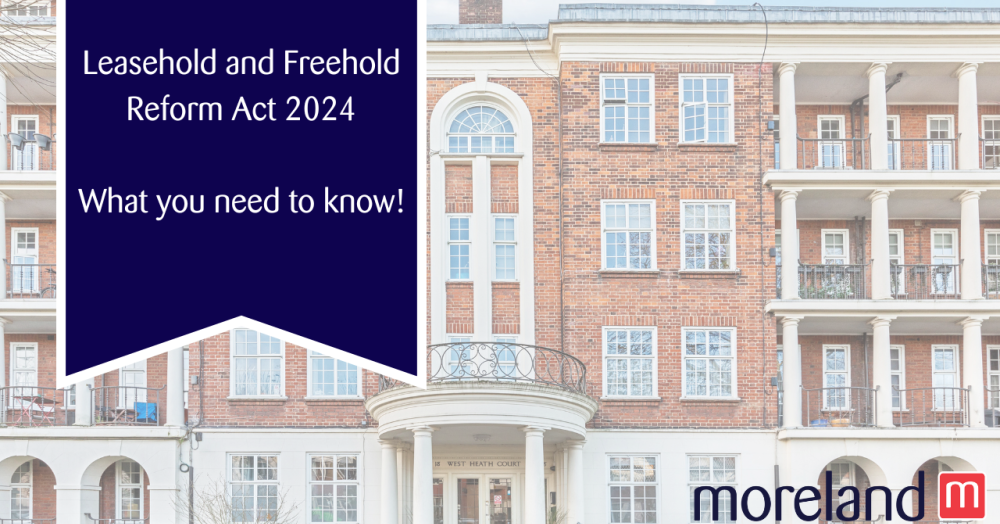The Leasehold and Freehold Reform Act 2024 is a landmark piece of legislation designed to make life easier and more affordable for leaseholders. Lots of information to digest here. Click through to read.
Leasehold reform: What’s the latest news?
The Leasehold and Freehold Reform Act became law in May 2024 however by Autumn 2024, with the exception of a few minor amendments, it has not yet come into force. After being elected in July 2024, the Labour government pledged to act quickly on this.
Campaigners and leaseholders had been left frustrated by a lack of action on the matter. However, in November 2024, the government set out a timeline of what to expect to happen and when. Read on to find out more. Until then, the current laws on leasehold remain.
What does the Act do?
The Act introduces several key changes to the leasehold and freehold system, including:
- Lowering Costs: It removes the requirement for leaseholders to pay their landlord’s legal fees when extending a lease or purchasing a freehold, making these processes more affordable.
- Banning New Leasehold Houses: The sale of new leasehold houses will be prohibited, except in limited circumstances.
- Regulating Insurance Commissions: The Act curbs excessive commissions charged on buildings insurance.
- Removing Ownership Barriers: It abolishes the two-year ownership requirement for leaseholders looking to extend their lease or buy their freehold.
- New Rights for Freehold Owners: Freeholders will now have similar rights to leaseholders in terms of estate charges and the transparency of their calculation.
- Easier Freehold Purchases: Leaseholders in mixed-use buildings will now be able to exercise their right to purchase the freehold or manage their building if commercial space makes up no more than 50% of the floor area (up from 25%).
- Longer Lease Extensions: The Act increases the lease extension term to 990 years, replacing the previous 90 or 50-year extensions under the LRHUDA 1993 and LRA 1967.
- Accountability for Landlords: Landlords who manage their buildings must now belong to a redress scheme, making it easier for leaseholders to challenge poor practices.
- Challenging Service Charges: The presumption that leaseholders must cover landlords’ legal costs when challenging service charges is removed.
- Right to Buy Out Ground Rent: Leaseholders now have a legal right to buy out ground rents, something that was previously only possible through a lease extension.

A statement from the government on 21 November 2024, sets out how and when the government will implement parts of the rest of the Act
January 2025: The government says it will start the removal of the two-year restriction on enfranchisement and lease extension claims from the point of property purchase.
Spring 2025: It says it will commence the provisions on the Right to Manage which increase access to the right for leaseholders in mixed-use buildings, alongside reforming costs and voting rights.
The government says it will consult very shortly on the detail of the Act’s ban on buildings insurance remuneration.
Summer 2025: The government will consult on the valuation rates used to calculate the cost of enfranchisement premiums. Parliament will need to approve the secondary legislation that sets out the detail, ‘as well as fixing the Act’s serious flaws in further primary legislation, before implementing the package’.
2025: The government will consult on implementing the Leasehold and Freehold Reform Act’s new consumer protection provisions for homeowners on freehold estates; and on service charges and legal costs and bring these measures into force as quickly as possible afterwards.
These anticipated reforms are eagerly awaited by homeowners and enfranchisement professionals alike.
If you are a leaseholder considering whether to extend your lease or purchase your freehold now or to wait, you should seek advice from a leasehold specialist.
However, what you may choose to do will depend on factors like your lease length and your circumstances. For example:
Lease length 80 to 82 years: It’s almost certainly advisable to extend. It’s unlikely that the reforms will be through before your lease drops below the “80-year mark” at which marriage value currently kicks in. There is no guarantee that it will be cheaper in the future than it is for you now.
Want to move or remortgage and the current lease is an issue: Probably best to extend.
Lease is above 82 years – It’s up to you: It is likely be made cheaper by the reforms, but it might also made more expensive. If you’re comfortably over the threshold, say 100 years, you could wait to see what reforms come.
Ground rent is above 0.1% of your property value (or rises to that level in the future): Consider waiting because it may be made cheaper for you in the future if the 0.1% cap applies to your lease.
Lease below 80 years: Again, you should consider waiting as it might be made cheaper for you in the future given abolition of marriage value.



